Eastern Blacknose Dace Rhinichthys atratulus photo Tom Murray
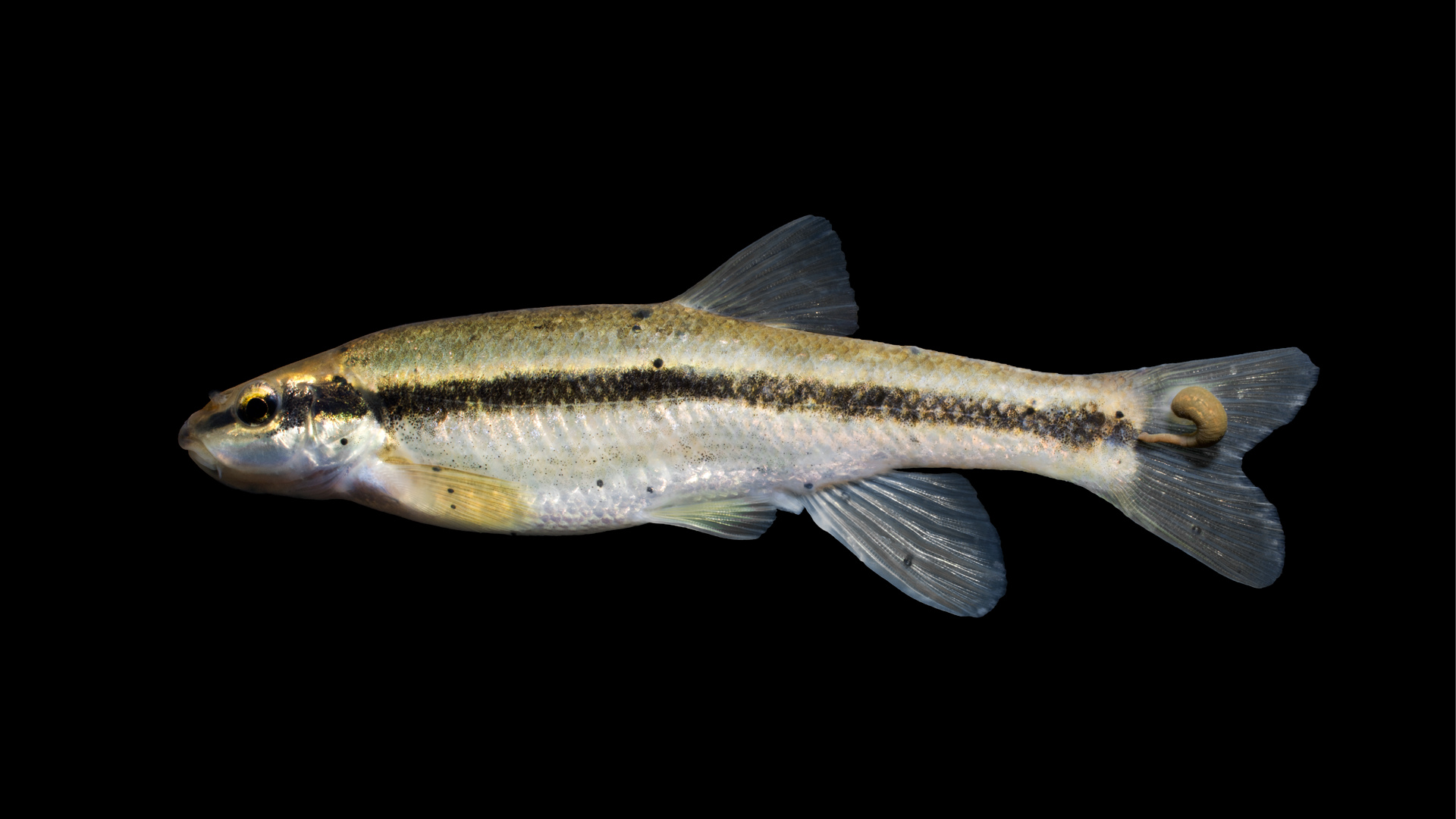
Rhinichthys atratulus »
No matter what you love, you'll find it here. Search Black Nose Dace and more. Looking for Black Nose Dace? We have almost everything on eBay.

Maryland Biodiversity Project Blacknose Dace (Rhinichthys atratulus)
group (longnose dace and Umpqua dace), the blacknose dace group (the blacknose dace), and the speckled dace group (speck- led, leopard, and Las Vegas dace) (e.g., see Hubbs et al. 1974 ; Miller
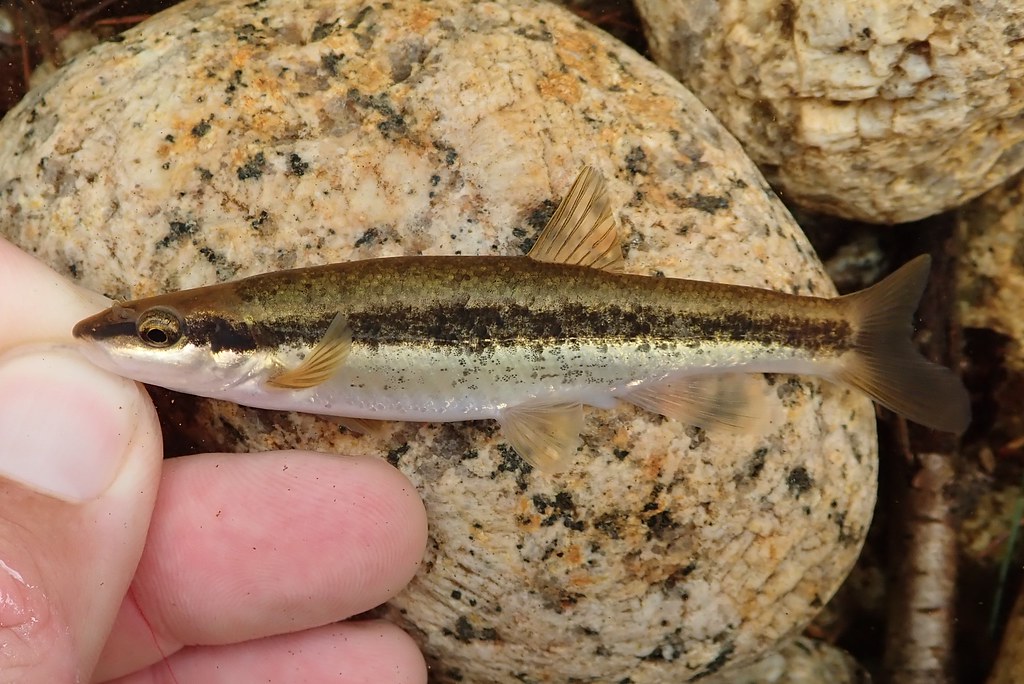
Eastern Blacknose Dace Rhinichthys atratulus Flickr
Eastern blacknose dace ( Rhinichthys atratulus) is a species of ray-finned fish in the genus Rhinichthys. Its name originates from the Old French word "dars" which is the nominative form of the word "dart" in reference to their swimming pattern. The western blacknose dace ( Rhinichthys obtusus) formerly was considered conspecific.

Eastern Blacknose Dace (Fishes of North Park) · iNaturalist
This study examines the genetic diversity of the eastern Blacknose Dace, Rhinichthys atratulus , a small minnow that tends to live in large populations in most of eastern North America, primarily within the Atlantic slope drainage (we distinguish between R. obtusus and R. atratulus; Nelson et al. 2004).

Eastern Blacknose Dace, Rhinichthys atratulus, Hogjowl Cre… Flickr
Rhinichthys atratulus (Hermann, 1804) Common name: Blacknose Dace. Taxonomy: available through. Identification: Becker (1983); Page and Burr (1991); Etnier and Starnes (1993); Jenkins and Burkhead (1994). Size: 10 cm. Native Range: Atlantic, Great Lakes, Hudson Bay, Mississippi, and upper Mobile Bay drainages from Nova Scotia to Manitoba and.

FIS00200061 Joel Sartore
Eastern blacknose dace (Rhinichthys atratulus) is a species of ray-finned fish in the genus Rhinichthys. Its name originates from the Old French word "dars" which is the nominative form of the word "dart" in reference to their swimming pattern. The western blacknose dace (Rhinichthys obtusus) formerly was considered conspecific. While.
Eastern Blacknose Dace Rhinichthys atratulus photo Tom Murray
Moapa dace likely inhabited 25 springs and approximately 16 km of the upper Muddy River (Ono et al. 1983). Historically the Muddy River was 30 miles long, however in 1935, with the completion of the Hoover Dam, Lake Mead flooded the lower 8 km of the river, rendering it unsuitable for Moapa dace. Recent investigations found adult Moapa dace.

FIS00200034 Joel Sartore
The blacknose dace prefers swift streams (Traver 1929; Harlan and Speaker 1951; Scarola 1973). Greatest densities of blacknose dace adults occur when surface water velocities are between 15 and 45 em/sec (Gibbons and Gee 1972). The species is common at gradients of 11.4 and 23.3 m/km, but almost entirely absent at 67.2 m/km (Burton and Odum 1945).

Eastern Blacknose Dace Natural Atlas
The eastern blacknose dace is about four inches in length. It is brown-olive on the back and upper sides and silver-white below. At the dorsal fin base, there is a black spot followed by a silver spot. Many black blotches can be seen on the back and sides.

Eastern blacknose dace Rhinichthys atratulus Gunpowder F… Flickr
Eastern blacknose dace (Rhinichthys atratulus) is a species of ray-finned fish in the genus Rhinichthys. Its name originates from the Old French word "dars" which is the nominative form of the word "dart" in reference to their swimming pattern. The western blacknose dace (Rhinichthys obtusus)…
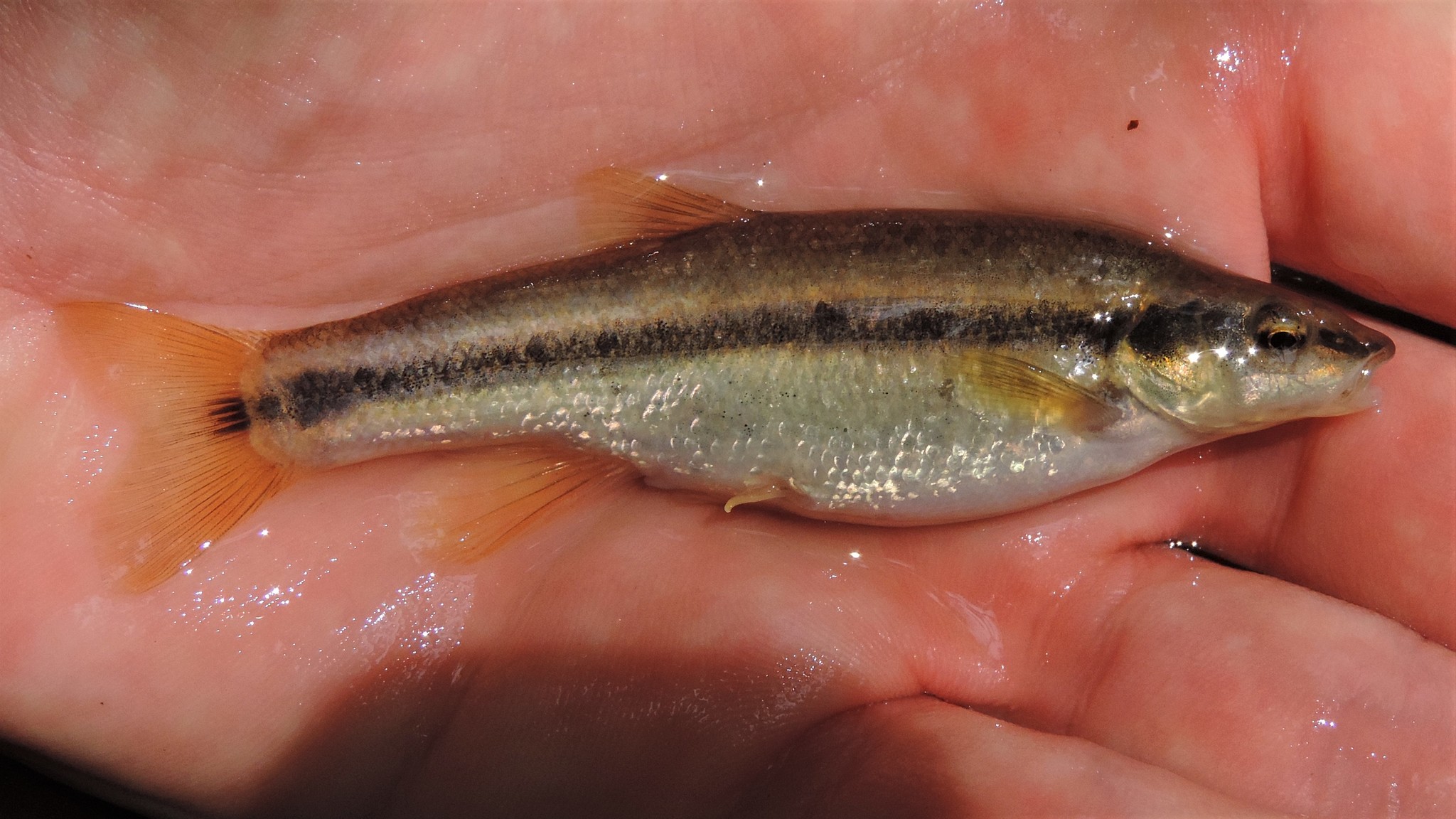
Maryland Biodiversity Project Blacknose Dace (Rhinichthys atratulus)
The eastern blacknose dace is found across the southeast portion of Canada and down along the United States' east coast. It is dark brown to olive on its dorsal surface and silvery white below, the two shades separated by the darkly pigmented lateral line. In the breeding season, males develop darker pigmentation and an orange lateral line.
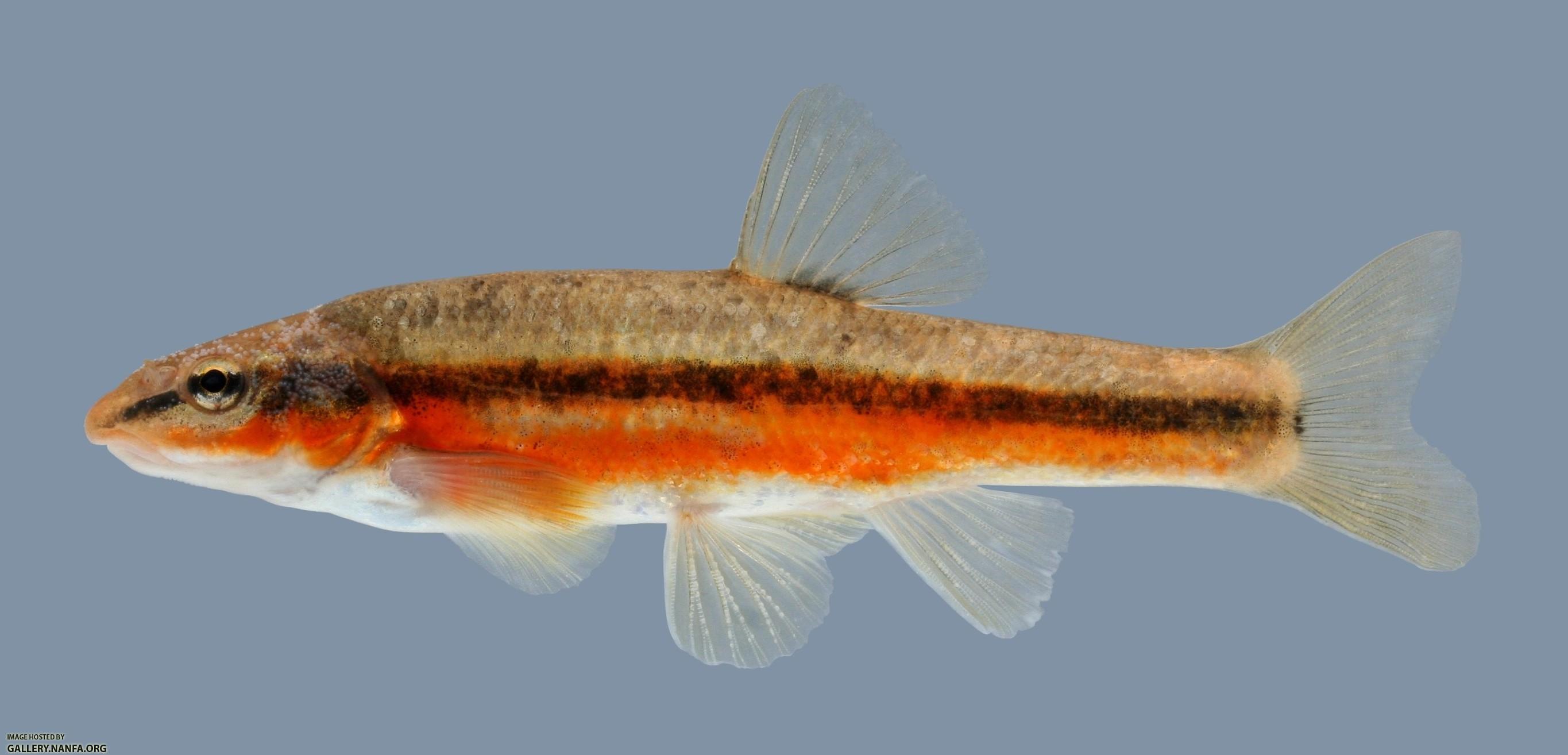
Rhinichthys atratulus Eastern Blacknose Dace
Eastern blacknose dace spawning takes place between May and June and occurs in shallow water over gravel riffles. During this breeding season, the male develops nuptial tubercles on various parts of the body including the head and fins. His coloration also turns orange-red during this time along the lateral stripe and pectoral fins.
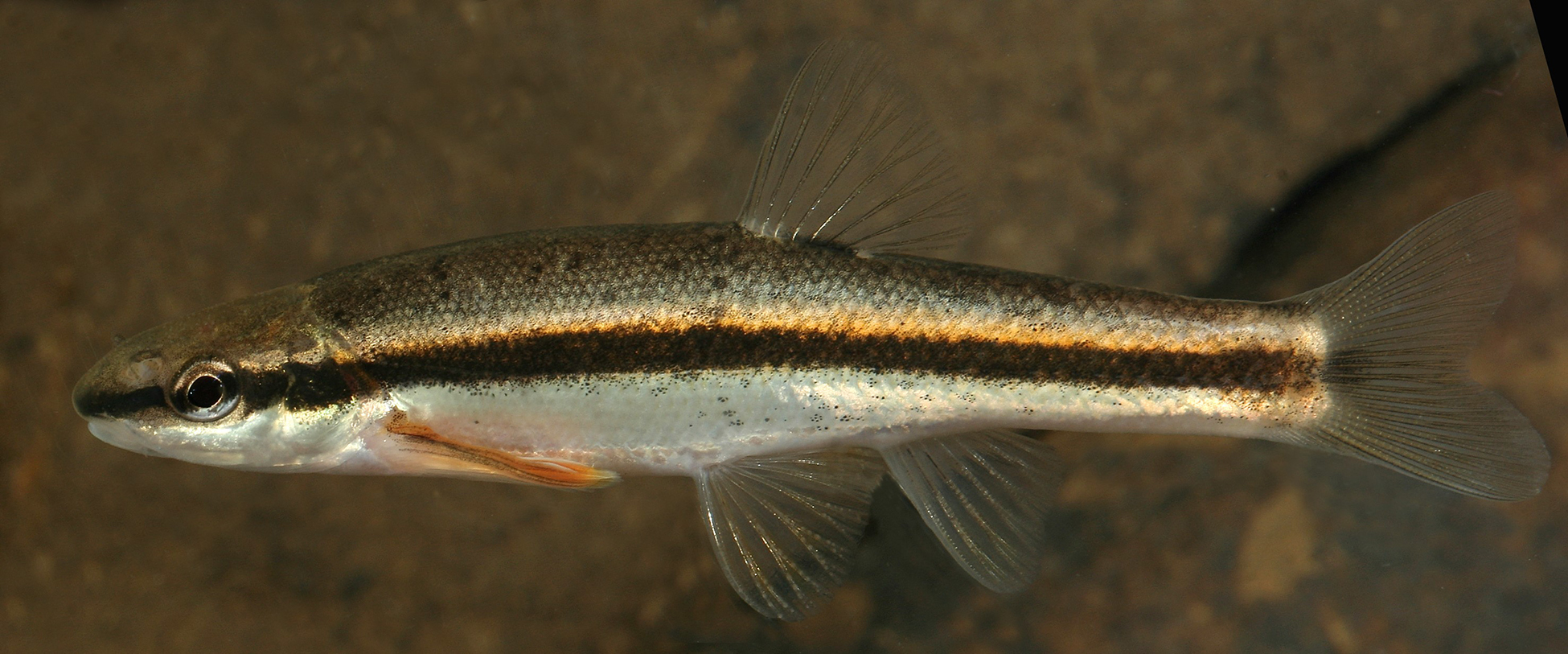
Rhinichthys cataractae »
Eastern Blacknose Dace ( Rhinichthys atratulus) Along with the longnose dace ( R. cataractae ), blacknose dace are one of the most common stream fishes found throughout the state of New York. These fish are small (2-3 inches), and are generally found within small streams and lake tributaries.

Chilling in the riffle Eastern blacknose dace (Rhinichthys… Flickr
Eastern Blacknose Dace Rhinichthys atratulus Tweet Description: This small minnow, about 2 1/2 inches, may be distinguished from other minnows by the black lateral band which extends around the snout backward through the eye to the tail. The body is plumply rounded in front and compressed behind.

Eastern Blacknose Dace Rhinichthys atratulus Headwater c… Flickr
Rhinichthys atratulus (Eastern Blacknose Dace) is a species of ray-finned fishes in the family Leuciscidae. They are associated with freshwater habitat. Individuals can grow to 12.4 cm. They have sexual reproduction.

Eastern Blacknose Dace in August 2022 by Cole Tiemann · iNaturalist
Eastern blacknose dace ( Rhinichthys atratulus) is a species of ray-finned fish in the genus Rhinichthys. Its name originates from the Old French word "dars" which is the nominative form of the word "dart" in reference to their swimming pattern. The western blacknose dace ( Rhinichthys obtusus) formerly was considered conspecific.